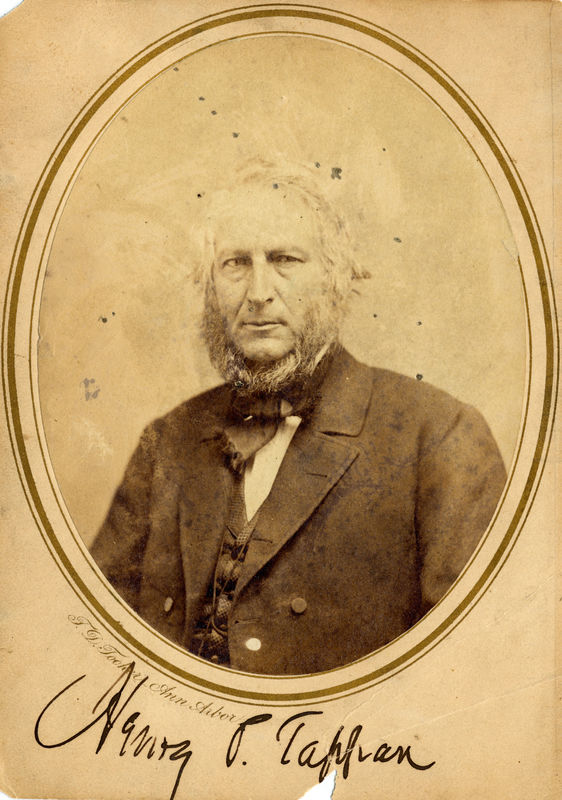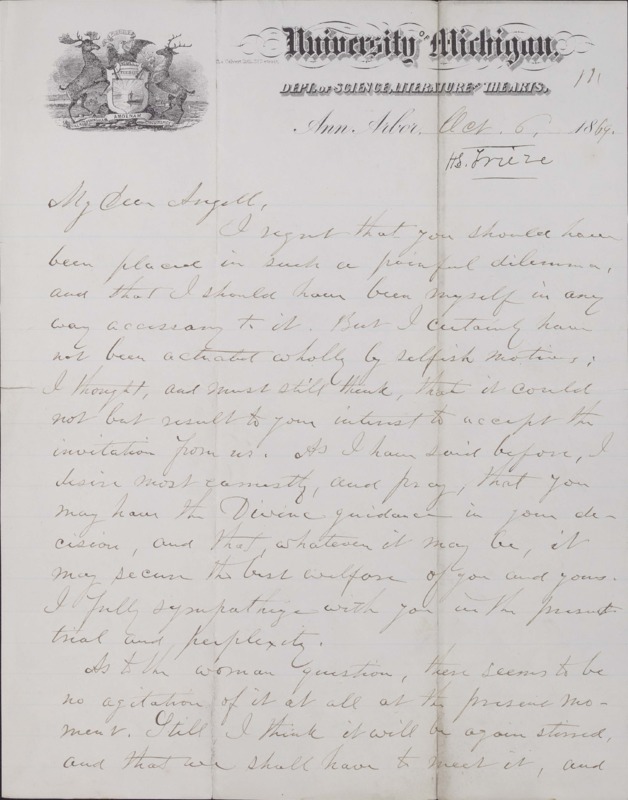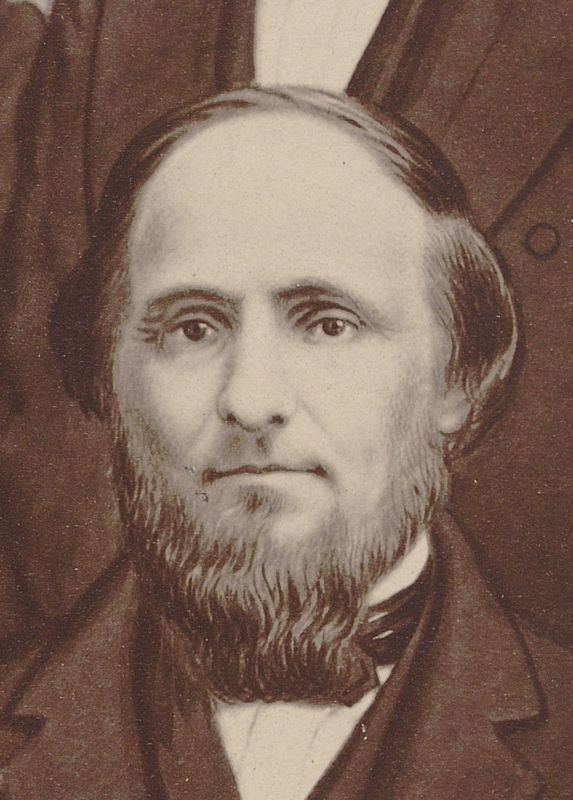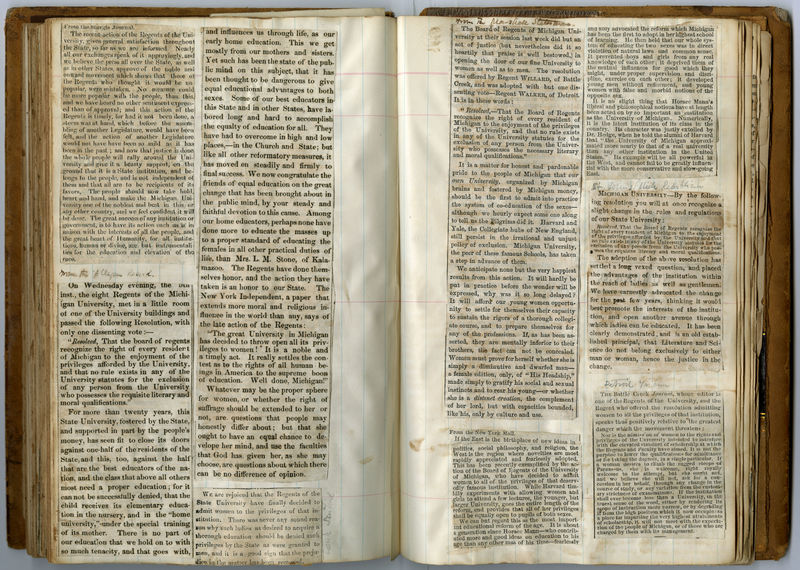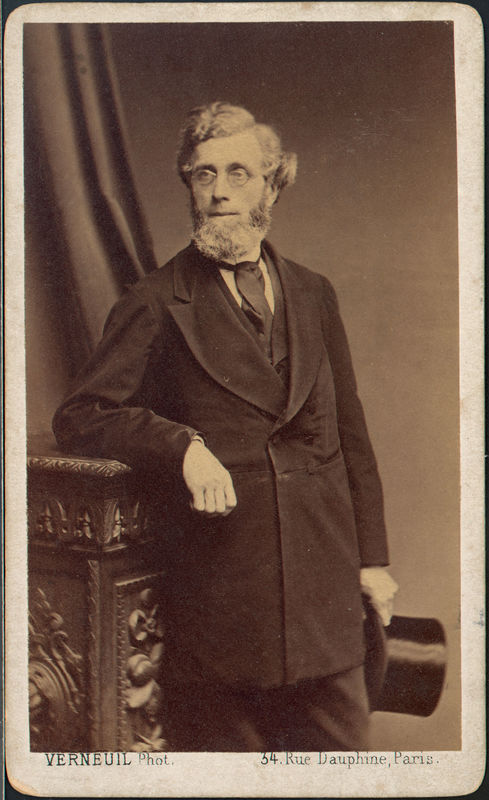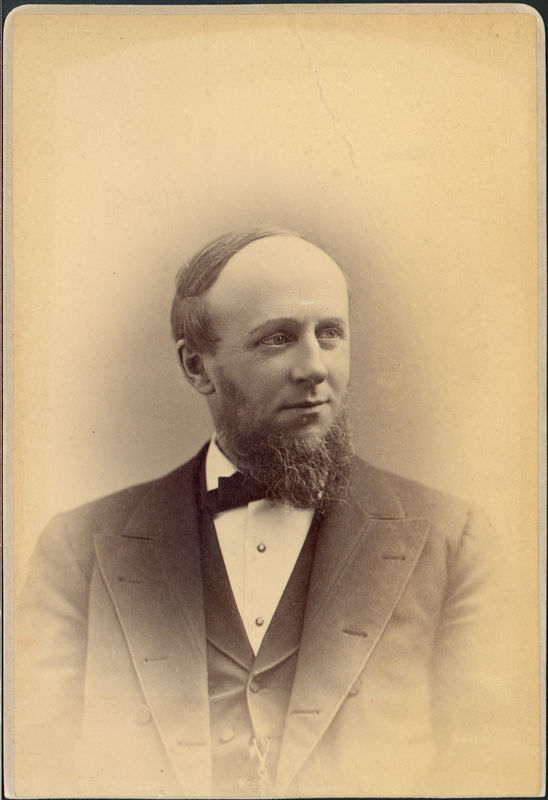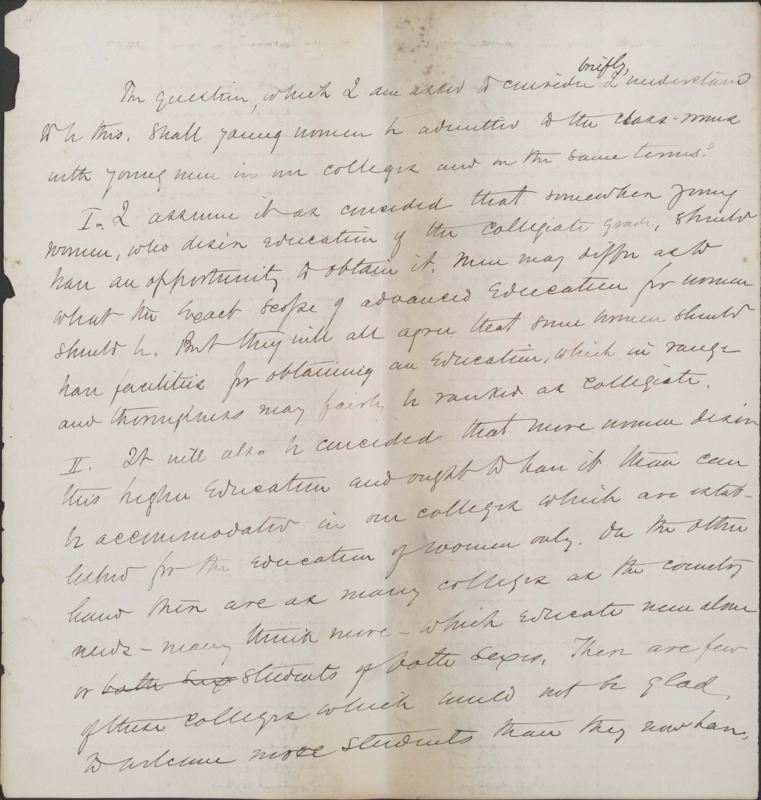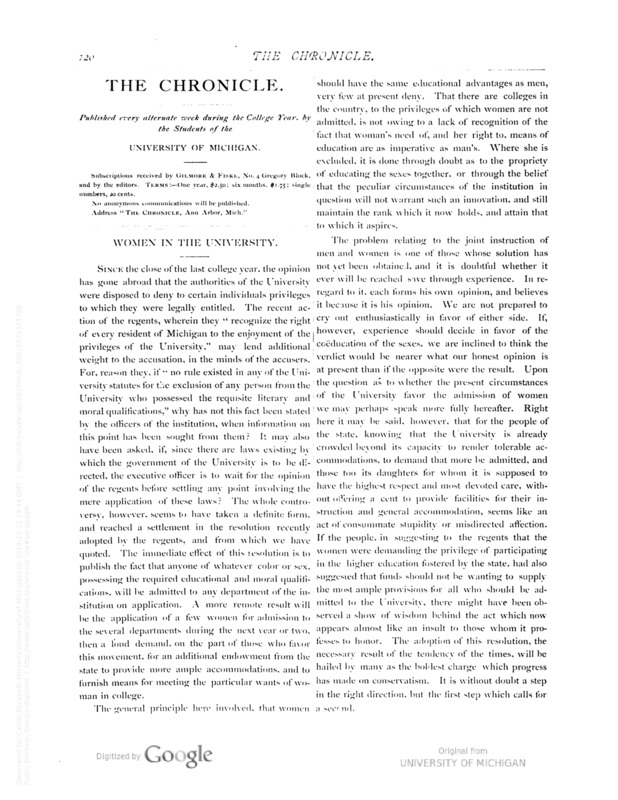Changing Ideas
President Henry Philip Tappan
It is no surprise that women failed to achieve admission to the University in 1858 during the tenure of Henry Philip Tappan, who served as the University’s first president from 1852 to 1863. In 1846, prior to coming to Michigan, Tappan spoke in support of the education of women generally to the Young Ladies’ Institute of Pittsfield, Massachusetts. He stated “Education is not confined to sex; it is the birthright of woman as well as of man. In the first place, woman has the same mental constitution as man : there is not a power or faculty which belongs to one, that does not also belong to the other.” [1] However, later in the address, he further explains that the education of each sex should not necessarily be equal in aim. “I would have female education in point of acquisition and mental discipline, placed on the same ground with that of men, with only one exception, and that is, the education of men is to be conducted in reference to public action; that of women in reference to private influence.” [2]
After leaving Michigan, Tappan wrote in 1867 to E.P. Evans, a former student then teaching at the University of Michigan, that he considered co-education inadvisable, and to be avoided. “Ever since I left Michigan, I have been looking for a movement to bring in the Women. After that no advancement is possible: On the contrary, the movement must be retrograde.” He questions whether society is going too far, “I sometimes fear that we shall have no more women in America. If the women’s rights sect triumphs, women will try to do the work of men—they will cease to be women while they will fail to become men—they will be something mongrel, hermaphroditic.” [3]
Henry Frieze and James B. Angell
The question of whether the University of Michigan would finally admit women fell at a time when the University was searching for a new president. Acting President Henry Frieze, seeking to recruit James B. Angell, then president of the University of Vermont, to the position, discussed the topic with Angell directly: “As to the woman question, there seems to be no agitation of it at all at the present moment. Still, I think it will be again stirred and that we shall have to meet it, and meet it fairly and liberally. I have about decided that it will be wisest for the university, after abolishing, perhaps, the privilege, now existing, of selecting miscellaneous studies, and thus confining all students to the regular courses, and the full preparation for them, to admit any females who may apply for admission with the required qualifications. The number, I am sure, would be very inconsiderable, and would affect the character of the institution but very little anyway; certainly not for the worse. As to reputation, which in reality has been the chief ground of objection hitherto, (though not confessed,) that cannot be long prejudiced.”
Regent George Willard
Rev. George R. Willard was a member of the Board of Regents from 1864-1873. Willard was an episcopal minister, Professor of Latin at Kalamazoo College, and Republican who served on the State Board of Education, as well as going on to the Michigan House of Representatives, and United States Congress. Willard was long an advocate for coeducation and pressured the University of Michigan first from outside as a legislator and then from within as a regent.
In April 1869, Willard brought his first resolution to the Board of Regents, pressing the board to adopt “That in the opinion of the Board no rule exists in any of the University Statutes which excludes women from admission to the University.” The resolution was tabled by a vote of five to three.[4]
In January 1870, Regent Willard tried again, taking a different approach. Rather than specifically allowing women, he asked “That the Board of Regents recognize the right of every resident of Michigan to the enjoyment of the privileges afforded by the University, and that no rule exists in any of the University statutes for the exclusion of any person from the University, who possesses the requisite literary and moral qualifications.” The resolution was initially tabled, but when it was taken up again later in that meeting, it was adopted by six votes to two. [5]
A scrapbook of news clippings compiled by Willard shows the local and national reception of the decision to admit women to the University in articles and editorials. Many of the articles are supportive, but some are appalled and condescending. One article from the Ann Arbor Argus suggests that the university should implement mandatory women’s coursework in cooking and cleaning, complete with a model kitchen. Within 5 years, there were more than 100 women enrolled studying subjects including medicine, law, and philosophy.
Henry Frieze
In July 1871, following the first full year of women attending the University, Acting President Frieze submitted his last report to the Board of Regents before handing the job to James B. Angell. His conclusions were conservative but positive: “Many inquiries have already been made as to the working of this new movement. It is manifestly too early as yet to speak of results. Certainly nothing has occurred during the year to occasion any misgivings in regard to its ultimate success. No difficulty or disadvantage has been met with. No one connected with the University, so far as I have learned, not even those members of the Faculties who were at first opposed, or distrustful, any longer express any regret on account of the ‘innovation,’ or any apprehension in regard to its effect, either upon our internal condition or our reputation abroad.” [6]
President James B. Angell
When James B. Angell came to Ann Arbor in 1871 to take the position of president, it was as a supporter of co-education, and in the years following he often spoke publicly of the success that had been achieved by women at the University of Michigan, rebutting the arguments frequently made in opposition. In 1873, he is quoted in An Address upon the Co-Education of the Sexes by Edward H. Magill stating his support for coeducation nationally based on the experience at Michigan: “President Angell, of the University of Michigan, in a letter recently received, says: ‘Those girls who do wish a collegiate education should have a chance to get it and since our colleges cannot be duplicated for women, they should be admitted, unless some serious practical objections can be shown. In fact, all who try the experiment report that there are none. We have not had the slightest embarrassment from the reception of women. They have done their work admirably, and apparently with no peril to their health.’” [7]
President Angell continued to speak out nationally as a proponent for co-education. In 1887, he published an essay on co-education in Baptist Quarterly, listing objections to the practice and refuting them one by one. Angell’s draft, found in his personal papers, shows the development of his arguments in favor of co-education, which he shared many times over his career as president.
The Chronicle
Even after women enrolled, students continued to debate the merits of co-education. The Chronicle, the predecessor to the Michigan Daily, published several editorials during the 1869-1870 school year commenting on the development of co-education. Into the twentieth century, literary societies on campus, such as Alpha Nu, would argue on the successes and failures of the subject as a topic at their meetings.
Notes
[1] Tappan, Henry Philip. “A discourse on education : delivered at the anniversary of the Young Ladies' Institute, Pittsfield, Mass., October 2, 1846, Page 38.
[2] Tappan, "Discourse on education", page 40.
[3] Perry, Charles Milton. “Henry Philip Tappan: Philosopher and University President”. Ann Arbor: University of Michigan Press, 1933, Page 362.
[4] “Proceedings of the Board of Regents .” April 1869, p. 326. Ann Arbor : The University.
[5] “Proceedings of the Board of Regents .” January 1870, p. 2-3. Ann Arbor : The University.
[6] “Proceedings of the Board of Regents .” July 1871, p. 113. Ann Arbor : The University.
[7] Magill, Edward H. An Address upon the Co-Education of the Sexes. C. A. Dixon & Co., 1873, Page 8.
[8] Co-education - address for symposium in Baptist Quarterly, December. 1886, Addresses and Articles, Box 9, "James B Angell Papers", Bentley Historical Library, University of Michigan.

